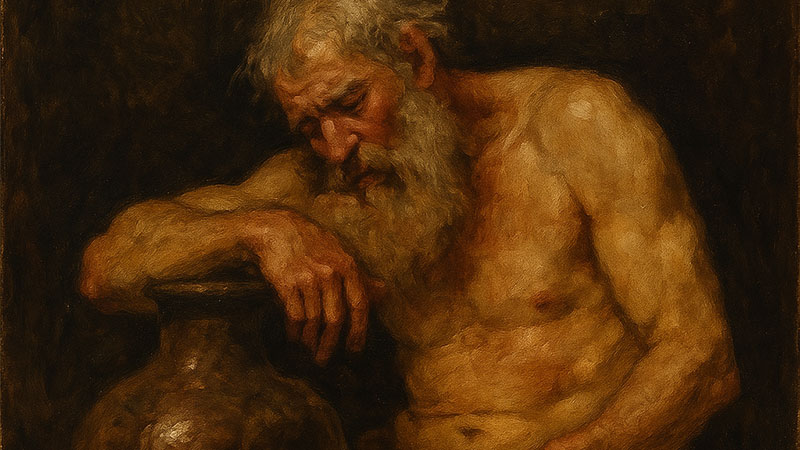Noah is one of the most well-known figures in the Bible. He is often remembered for his obedience to God, his building of the ark, and his survival through the great flood.
But what many don’t talk about as much is what happened after the flood, when the waters had gone down and life began again. According to the Bible, even this righteous man had a moment of weakness. That raises a question that has puzzled many: What was Noah’s sin?
In this article, we will explore this question by looking closely at the Bible’s account in the book of Genesis. We’ll look at what happened, why it matters, and what we can learn from it today. From a Protestant perspective, we will also discuss what this story reveals about human nature, grace, and the need for salvation through Jesus Christ, the only way to eternal life.
Noah’s Story: Faithful but Still Human
Noah’s life is a powerful example of faithfulness in the midst of darkness. At a time when the whole earth was filled with violence, corruption, and moral decay, one man stood out. Genesis 6:9 describes him this way: “Noah was a righteous man, blameless among the people of his time, and he walked faithfully with God.”
God saw Noah’s heart and chose him for a sacred mission: to build an ark that would save not only his family but also a remnant of creation. This divine favor set him apart from the generation of Noah, who had become corrupt. While the world mocked him, Noah obeyed.
He spent years building the ark with no sign of rain, simply because he trusted God’s word. And when the flood came, just as God had warned, Noah’s obedience led to salvation.
Genesis 7:23 tells us, “Only Noah was left, and those with him in the ark.”
After the floodwaters receded, Noah and his family stepped onto dry ground into a brand new world. It was a moment of hope and renewal. God made a covenant with Noah, a promise sealed with a rainbow, that never again would He destroy all life with a flood.
In Genesis 9:11-17, we see God speaking blessings over Noah and giving him authority to begin again. It was a new beginning, not just for Noah but for all of humanity.
But just as the story of human history began with a fall in the Garden, Noah’s story after the flood also took a turn. Though Noah was faithful, he was still human, and like all of us, he wasn’t without weakness. In the very next part of the story, we see an incident that reveals his vulnerability and need for grace.
This unexpected moment reminds us of a deeper truth: even those who walk closely with God are not immune to failure. Yet, God’s faithfulness remains greater than our flaws.
What Was Noah’s Sin?
The Bible tells us about Noah’s fall in Genesis 9:20-21:
“Noah, a man of the soil, proceeded to plant a vineyard. When he drank some of its wine, he became drunk and lay uncovered inside his tent.”
This is the moment many refer to when they speak of “Noah’s sin.” But what exactly was wrong here?
- Drunkenness: According to many Bible scholars, Noah’s sin began with his excessive drinking. Drunkenness in the Bible is consistently presented as a moral failure. Ephesians 5:18 warns, “Do not get drunk on wine, which leads to debauchery.”
- Shame and exposure: Lying naked and uncovered in a drunken state brought shame not only to Noah but to his family. In that culture, honor and modesty were important. Noah’s son Ham saw his father’s nakedness and disrespected him, leading to more conflict and division.
While the Bible does not condemn Noah as harshly as others, his actions serve as a reminder: Even the most faithful are not without weakness.

Understanding the Deeper Meaning of Noah’s Sin
The account of Noah’s sin in Genesis 9 is not simply a story about a man drinking too much wine. At its core, it reveals a deeper truth about the human condition that even the most faithful are not immune to weakness and that sin touches every life, even those whom God has chosen and blessed.
The Reality of Human Brokenness
The Bible repeatedly affirms that all humans are affected by sin. Noah, who had been described earlier as “a righteous man, blameless in his generation” (Genesis 6:9), still fell into error. This shows that righteousness before God does not mean moral perfection. As Romans 3:23 declares:
“For all have sinned and fall short of the glory of God.”
Noah’s fall reminds us that even the best among us are still part of a broken world. This doesn’t diminish his faith or obedience, but it shows that no one is exempt from the effects of sin.
A Warning for Every Generation
This passage serves as a sobering reminder: great spiritual victories are often followed by moments of temptation. Noah had survived the flood, obeyed God faithfully, and received His covenant blessing.
To learn more about God’s covenant with Noah, you can explore this topic further. But once the crisis was over, his guard came down. This pattern is common in Scripture and life; moments of spiritual rest can quickly become occasions for spiritual danger.
The Bible warns believers to remain alert. 1 Corinthians 10:12 puts it plainly:
“So, if you think you are standing firm, be careful that you don’t fall!”
Noah’s story challenges us to walk humbly, to never assume we’ve “arrived,” and to continually depend on God, not just in the storms, but also in seasons of peace.
A Story That Points to a Greater Hope
Ultimately, this story doesn’t just expose sin; it points us toward grace. Noah’s sin highlights the need for someone greater, one who is not just righteous in part, but holy and blameless in full. The Bible prepares us, from the earliest stories, to anticipate a Savior who will deal with sin not by avoiding it, but by conquering it.
That Savior is Jesus Christ, the only one who lived a sinless life. Where Noah stumbled, Christ stood firm. Where Noah needed grace, Christ offers it freely. Through Him, the brokenness we all carry is met with forgiveness, healing, and restoration.
Why This Story Still Matters Today
You might ask, Why is this ancient story important to me? Here’s why:
- It shows that God uses imperfect people. Noah was righteous, yet he still made mistakes. God didn’t abandon him.
- It teaches us to stay humble and dependent on God’s grace. 1 Corinthians 10:12 says, “So, if you think you are standing firm, be careful that you don’t fall!”
- It points us to the need for salvation through Jesus Christ, the only One who lived without sin.

The Only Way to True Righteousness: Jesus Christ
Noah’s story ends with failure, but the Bible’s story ends with hope in Christ. The Bible teaches that Jesus is the only way to salvation. In John 14:6, Jesus said, “I am the way, and the truth, and the life. No one comes to the Father except through me.”
While Noah was saved from the flood by building the ark, we are saved from judgment by trusting in Jesus, who died for our sins and rose again.
Romans 5:8 reminds us:
“But God demonstrates his own love for us in this: While we were still sinners, Christ died for us.”
Final Thoughts
Noah’s sin shows us that even the most faithful people can fail. But it also shows us something even more powerful, that God’s grace is greater than our weakness. From a Protestant understanding, this story is a powerful reminder that salvation is not based on how good we are but on faith in the only perfect One, Jesus Christ.
If you’ve ever felt like your mistakes are too big, remember Noah. And more importantly, remember that Jesus stands ready to forgive and restore you when you come to Him in faith.
For more teachings rooted in Scripture, visit Peidayesh, where truth, life, and hope are found through faith in the living God.
FAQ
Noah’s sin was twofold: first, his drunkenness, which is consistently portrayed in the Bible as a moral failure. Second, his state of nakedness brought shame and disrespect upon himself and his family. This incident showed that even a righteous man could fall into error.
This story teaches us that no human is immune to sin, not even Noah, who was a righteous man. It serves as a warning that we must remain vigilant and humble after spiritual victories. Additionally, it highlights our need for a perfect and sinless Savior, Jesus Christ.
The story of Noah reveals human weakness and the need for a perfect Savior. Jesus Christ is the only one who lived a sinless life and, through his death on the cross, provided grace and forgiveness for our sins. While Noah was saved from the flood through an ark, we are saved from eternal judgment through faith in Jesus.









Add comment